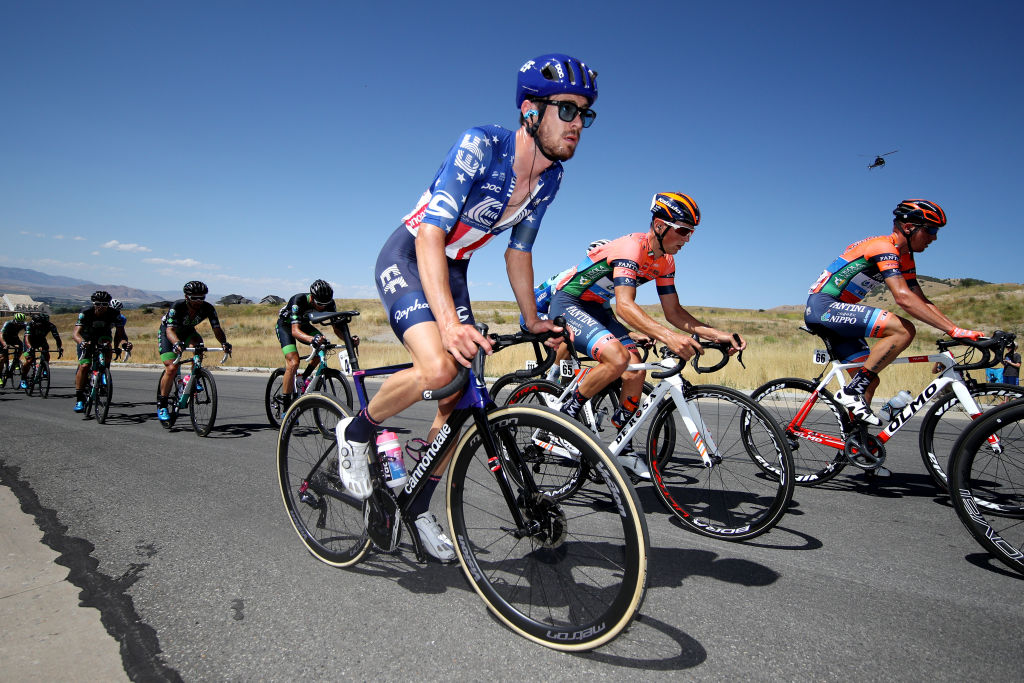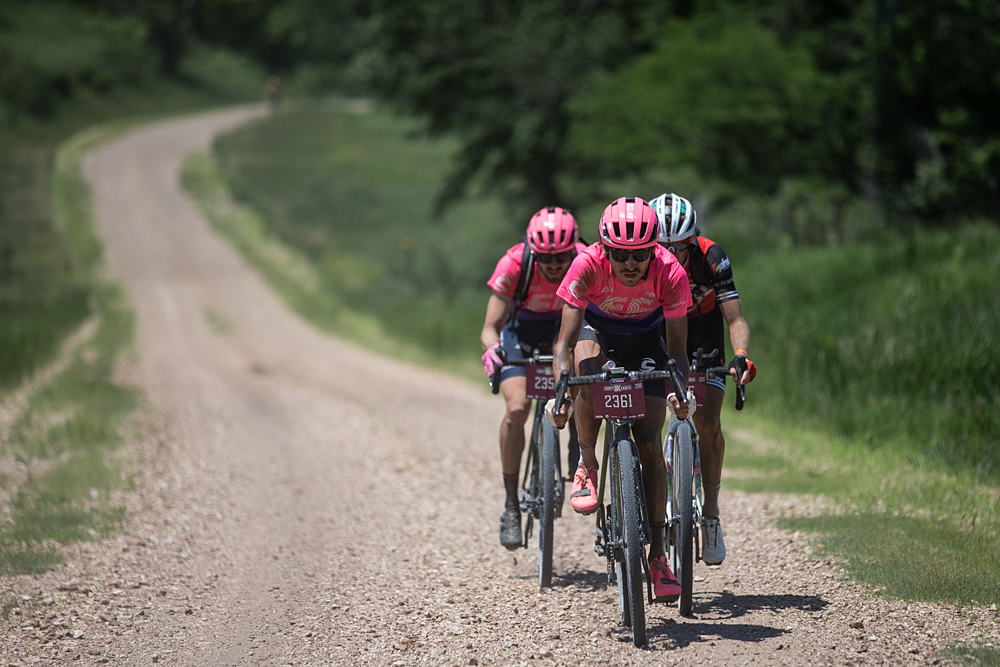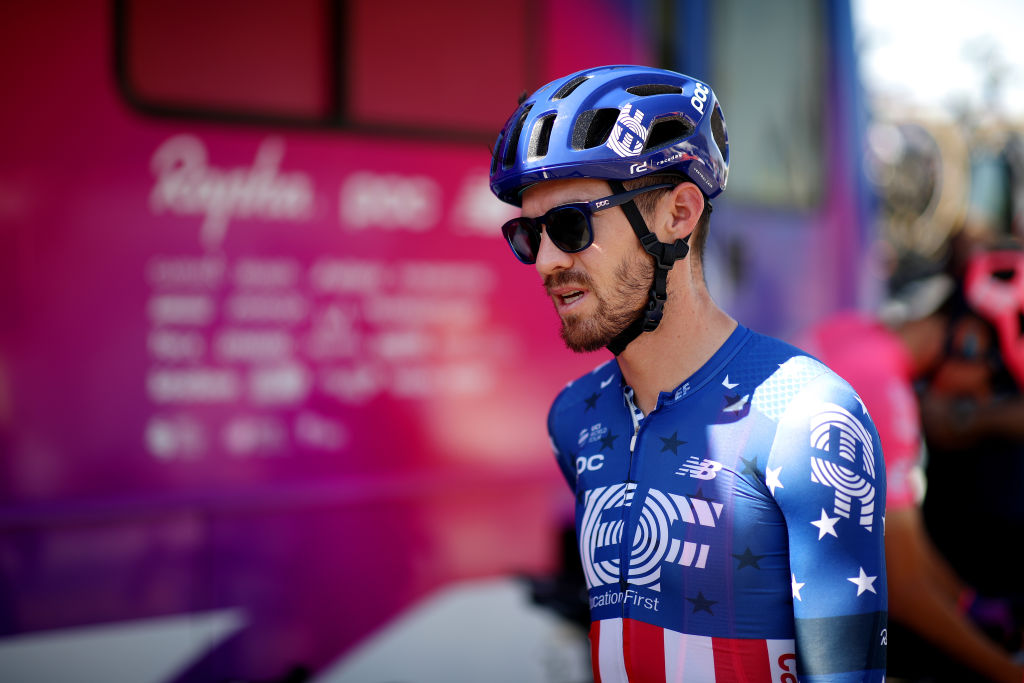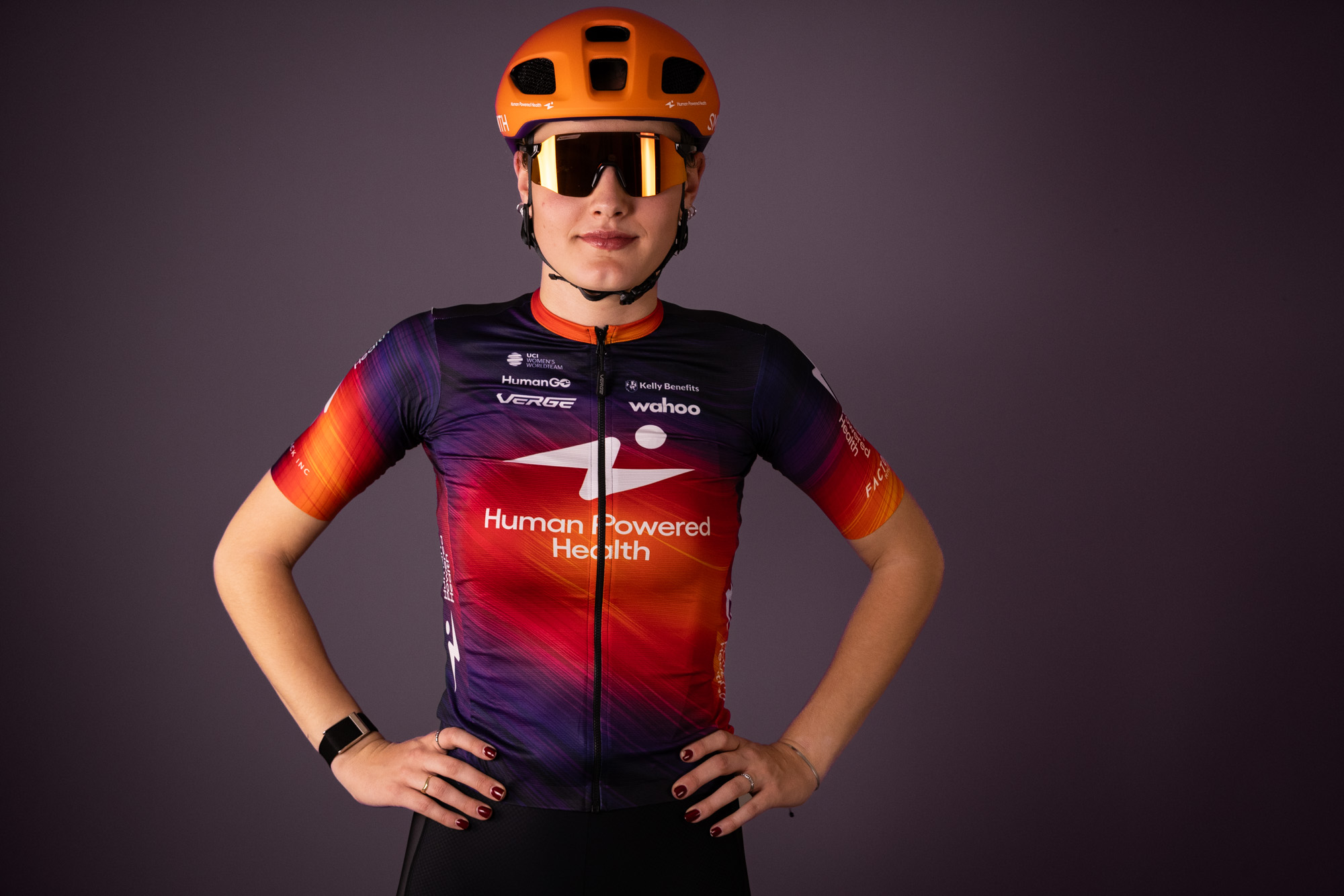Howes: It’s easy for people to forget that WorldTour riders are humans too
American champion on facing the end and balancing the professional life

Alex Howes sat on the side of a road in Spain and waited to die. He had crashed on a corner while descending a hill and landed forcefully on one of the two water bottles tucked up his jersey. After sliding off the tarmac, he managed to drag himself onto a crash barrier and, sitting in the mid-afternoon sunshine, he quietly waited for the catastrophe to manifest itself.
"It sounds kind of funny saying it now, but it really felt like I detached my aorta," Howes says four years on. "That was the feeling I had: I'm going to be dead in 45 seconds. I kind of rolled off the side and sat down on the guard rail.
"I sat there for a few minutes and I was just waiting to die. It sounds dramatic, it sounds ridiculous, but it happened. I was like, I've just killed myself. I'm going to be dead any second now."
A couple of minutes went by. He had been at the head of the race, but now the peloton had swooped past him. Teams cars hurried along behind, parping horns. The sun continued to shine. Howes' aorta, it seemed, was still intact.
Life was going on after all. That was a relief. The bike race was going on, too. That was a concern. He needed to catch up to it. He set that sudden brush with mortality to one side – "a routine crash," per the post-stage reports – and gave chase. The pro's life in microcosm.
"I was like, I'm not dead yet. I guess my heart's still beating. So let's see if we can get down the rest of this hill and see how it goes," says Howes.
Even before the crash, Howes had been struggling with illness, but he made it to the finish that day, and again the next. His Vuelta a España wouldn't get any easier – it never does – but he made it all the way to Madrid.
The latest race content, interviews, features, reviews and expert buying guides, direct to your inbox!
Two weeks after that, he was on the start line at the World Championships road race in Richmond. On home roads, he was the highest American finisher, placing 12th in the chasing group just behind new world champion Peter Sagan.
From the precipice to surviving to what felt close to the form of his life. Thinking it over now, Howes utters something akin to the cyclist's creed: "I never want to do that again, but I wouldn't trade it."
The End
In the summer of 2018, Howes had cause to ruminate at greater length over his mortality as a cyclist. He first noticed the symptoms at home in Colorado, while he was trying to beat himself into shape for the Tour of Utah and the Vuelta.
He had felt sluggish for around a month and he alarmed himself when he stood on the weighing scales and saw that he had lost almost 5kg in two weeks. On rides with friends who work nine-to-five office jobs, he found himself unable even to hold the wheels. Howes initially wondered if, at 30 years of age, he had simply begun to decline physically.
"I didn't know what was wrong with me, and I just thought, I'm a bag of shit, it's over. I was really bad," Howes says.
He rode the Tour of Utah and could barely put two pedal strokes together for five days before abandoning ahead of the final stage. He would not – could not – ride the Vuelta. Something was clearly awry.
A battery of tests eventually revealed that Howes was suffering from hyperthyroidism, but it was initially feared that his malady was altogether more serious. "It was scary, because some of the indicators for an overactive thyroid are the same as for liver cancer," he says. "It was a big relief when I found out I didn't have cancer, but I still didn't know what was going on."
Howes still had another year on his contract with EF Education First, but while the team's medical staff deliberated with specialists about his hyperthyroidism treatment and his prospects of returning to the peloton, he was steeling himself for The End.
"I thought, my ticket's up," he says. "30 years old: that's a good career, so here we go. Bye." He was, for the first time, seriously picturing what civilian life might look like. "I was thinking about what to do next, although I haven't come up with any good ideas," he says. "But then it's pretty hard to come with any good ideas when you're stressed out because your body's failing you and you have massive anxiety. Turns out that's a side effect of hyperthyroidism…"
One of the things that had separated Howes from riders of equivalent promise in the amateur ranks was his robustness. If raw talent had carried him to the cusp of the WorldTour ranks, then it was his ability to turn up to work, day in, day out, that had kept him in The Show for the bones of a decade.
His contemporary Blake Caldwell, for instance, almost beat Tyler Hamilton to a national title at the age of 22 but would retire within two years due to repeated broken bones. "He was a super talented rider, but he had low bone density, and he realised that if he kept racing, he was going to break everything," says Howes, who now wondered if reliability was no longer his calling card.
Some hyperthyroidism sufferers are compelled to take medication for the rest of their lives, but he responded well to his treatment in the autumn of 2018. "Every case is kind of individual and unique," he says. After a long stint off the bike, he was given the all-clear to resume racing at the start of 2019. "At the moment, I'm not taking any medication for it," Howes says, and laughs: "I'm just doing some hippie diet crap and I feel pretty good."
Alternative calendar
Howes' return to action coincided with EF Education First's announcement that some of its riders would include what the team described as 'alternative racing' in their 2019 schedules.
The highfalutin press release hardly allayed suspicions that it might prove little more than a marketing gimmick to hawk €200 bib shorts, but the identities of the riders involved – Howes, Lachlan Morton and Taylor Phinney – lent the exercise authenticity. Had Howes never made it to the WorldTour, events like Dirty Kanza and the Leadville 100 are precisely where he would have wound up.
"It was going home, really," Howes says. "That's probably the biggest reason why we were received so well. Lachlan, Taylor and I all really grew up on the local Colorado and US scene, so doing these races, we saw so many guys we grew up racing with. It was like, aw man, he's still ditching work to come out here. It was like going to a family reunion or something."
Dirty Kanza came between the Tour of California and US National Championships, while the Leadville 100 immediately preceded the Tour of Utah in August, and the events fitted neatly into Howes' schedule, given that he didn't ride any Grand Tours in 2019. They also tallied with his lifestyle, given that, having married and made a home in Colorado, he endeavours to spend more time in the United States than in his European base of Girona.

"I think a lot of guys see me playing around on the gravel bike in the United States and they think, ah, he doesn't want to be a European professional, but it's not that I'm not professional," Howes says. "It's funny, the gravel and mountain bike stuff. People say, ah they're just off there screwing around. Well, I could be doing that, or I could be one of the guys at the bar for three weeks in the off-season. I'd say doing a gravel race here and there is a pretty healthy release. It keeps you sane."
Therein lay the attraction of the project. Howes placed third on the gravel in Kansas and 5th on the mountain bike in Colorado, but – twee though it may sound – the results were always secondary to the experience, which provided a welcome escape from the pressures of his day job in the WorldTour.
The trend is not confined to EF Education First or Peter Stetina, who leaves Trek-Segafredo to become a full-time gravel rider in 2020. Witness Thomas De Gendt and Tim Wellens' end-of-season cycle touring, Daniel Oss' 'Just Ride' solo randonée or even Alex Dowsett's occasional cameos in local 10-mile time trials. A great deal of professional cycling is all about the money, but in the beginning, it was all about the bike. An occasional reminder never hurts.
"I think it's easy for a lot of people to forget that WorldTour riders are people. We're humans too," Howes says. "We spend a lot of time sitting on top of mountaintops, not talking to anybody and eating rice. It's really fucking hard sometimes. You need a bit of a release from that.
"In the beginning, we're all kids who just love to ride their bikes and deep down inside, I think that's where most – probably all – of us are at. And at a certain point, people can start to look at cycling as just a job. And that's a scary thing, when your job is to go suffer up mountains every day. You realise pretty quick: if I don't love this, this is the worst job in the world."
Stars and stripes
Some days, very rare days, it is the best job in the world. June 30, 2019 was one of them. A decade ago, Howes was national champion as an under-23 rider, but the title had always eluded him a professional.
The event became his White Whale, even if it is difficult to picture Howes, eclectic of interest and self-deprecating of demeanour, as a monomaniacal Ahab. The near misses of years past were excised on a sweltering afternoon in Knoxville, when he claimed the stars and stripes ahead of Stephen Bassett.
"When I was coming up, everybody was like he's a good one-day racer, he's perfect for nationals," Howes says. "Every course we did, it was yeah, that's a good course for Howes, this could be the year. I played that game for ten years and it was like, fuck, when's it going to happen?"
When Howes was first diagnosed with hyperthyroidism, he assumed the opportunity had passed him by, and so Nationals became an ever more pressing target when he was given the all-clear to race in 2019. A bout of illness after Dirty Kanza forced him to miss the Tour de Suisse, and so he prepared for the race at home in Colorado.
"I said if I'm not doing Suisse then I need to buckle down: you've just got to get that frickin' jersey," Howes says. "So I went absolutely all in, and trained my butt off, and just tried to visualise good things. And it worked out, so I'm pretty happy."
Howes jokes about the practicalities of wearing the stars and stripes – "I still feel weird putting my jersey in the laundry hamper after I've worn it. You're not supposed to put the flag on the ground, you know…" – but he revels in being an ambassador for his country's cyclists abroad.

The jersey also lends more heft to his concerns about the state of racing in the United States, where the quantity of competition on the domestic calendar has receded dramatically from the highwater mark that coincided with his teenage years.
Where once American riders were weaned on a diet of criteriums, the landscape has shifted towards mass-participation sportives, both on and off-road – including, of course, events like Dirty Kanza.
"When I was a junior, a lot of times I raced four times a week, between midweek time trials, mountain bike short track and racing both days on weekends. And it was racing – crashing, bumping elbows, skidding through corners – so you really got a good knack for it," he says.
"Now a kid who gets a podium at a fondo, that's a good ride and you have to really push, but it's not racing necessarily. It will be interesting to see how that changes riders coming into the WorldTour from the States. I don't know. Fondos are fricking hard, but it does seem like the actual pure racing is fading away."
An Education
Bar one season as an amateur in Marseille with VC La Pomme, Howes has been part of what is now EF Education First since 2003, when Jonathan Vaughters established the 5280-Subaru junior team. The outfit has since gone through more mergers than Sterling Cooper, but through all the contractions and expansions of budget, and the turnover of roster and staff, Howes feels that its ethos has remained intact.
"We're not necessarily gunning to be the winningest team. We just want to have a team that people can really believe in what we're doing and believe in the results that we get. There might be a better way to say it, but we want to be the favourite team. We want to be loved," he says. "And we still get the 'if anybody does drugs in this room, everybody is fired' talk every year, so that's good to hear."
Howes' first year with the WorldTour team coincided with something of an existential crisis for Vaughters' project. When the team stepped up to the professional level as Slipstream in 2008, there was a tacit understanding that the roster included a number of riders who had doped during their time at US Postal but were now racing for a squad whose stated calling card was its credibility.
That understanding became altogether more explicit when Christian Vande Velde, Tom Danielson and David Zabriskie's confessions of doping were published in USADA's Reasoned Decision on the Lance Armstrong case. (A year later, Ryder Hesjedal would confess to doping during his mountain bike career.) But while the period was a tumultuous one for the team, the younger riders on the roster, Howes included, were simply glad to have it out in the open.
"I don't know if relief is the right word, because it was a mess, but it was never all going to be under the rug forever. And I think anybody who thought that was dreaming," Howes says. "Those riders who were involved in it, I think they thought, 'If this comes out, I'm going to be sent off the edge of the earth and off into outer space.'
"I was like, 'Come on, guys, everybody already knows, kind of. We don't know the details but nobody's fooling anybody here.' It needed to happen. 100 percent, it needed to happen. This sport needs to heal and in so many ways it has."
Howes, for his part, evinces faith in the probity of the current peloton – "I trust cycling, but at the same time, maybe I'm the fool. Who knows?" – and he even drew encouragement from how ketones were being whispered about as the elixir of choice among some of the top teams at this year's Tour.
"They were writing articles about ketones and how this is the next thing. It's basically a kind of fat," Howes says. "If this is what we're talking about, then how good is this? It's a pretty clean sport. They're not illegal and it's not EPO. It's not a bag of blood nailed to the wall. This is a very good thing."
The Future
Last month, it was confirmed that Howes would remain with EF Education First for another two years, bringing his WorldTour tenure with the squad to ten consecutive seasons. That outward appearance of stability can at times be deceptive. "It might look like it, but it's never been a given that I'll be on the team every year," Howes says. "And it's certainly never been a given that this team would exist."
In the summer of 2018, it wasn't even a given that Howes would ever race a bike again, and while his health scare underlined the finite nature of his line of work, it also accentuated his emphasis on the here and now. "When I came back, I wanted to do every race, do an extra hour or two after every training ride. I've slowed down a little bit since, but I love it still."
The national title may have been annexed, but some old goals still remain. The Olympic Games, for instance, even if Howes concedes that making the cut for the two-man US selection in Tokyo will be difficult. All four of his professional wins have come on home roads; his lack of a victory in Europe is an irritation. "I really want to do. Maybe after I retire, I'll just do kermesses in Belgium until I win one and then go home," Howes jokes.
Alternative races will also, in one form or another, continue to occupy real estate in Howes' schedule. In cycling, one can never underestimate the importance of balance.
"I think every professional, we all have days, where we're laying in a ditch with broken bones, soaked to the bone, thinking, what the hell am I doing out here? This is a huge mistake, I should have gone to college. What have I done with my life?" Howes says. So when you have something like this alternative programme, something fun, where you have an adventure and play on the bike a little bit – you have to do that."

Barry Ryan was Head of Features at Cyclingnews. He has covered professional cycling since 2010, reporting from the Tour de France, Giro d’Italia and events from Argentina to Japan. His writing has appeared in The Independent, Procycling and Cycling Plus. He is the author of The Ascent: Sean Kelly, Stephen Roche and the Rise of Irish Cycling’s Golden Generation, published by Gill Books.
